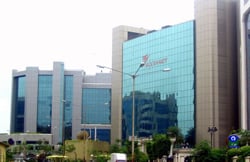 |
| Wockhardt's headquarters in Mumbai, India--Courtesy of Wockhardt |
FDA Form 483s and warning letters for failing to meet quality standards come with substantial costs. They mean investments of one kind or another will be needed, sometimes interrupting production. But when problems escalate to the point that the FDA issues an import alert, banning products it says may be unfit, then costs can skyrocket even as revenues take a heavy hit. With two Indian plants on the FDA import alert list and a U.S. facility recently written up, that is what has happened to India's Wockhardt.
The generic drugmaker reported this week that its April-June net profit was off 94% compared to the same quarter a year ago, producing 199.5 million rupees ($3.26 million), down from 3.23 billion rupees ($52.9 million) a year earlier, Reuters reported. The company's net sales were off 60% in the U.S. and fell 27% overall to 9.91 billion rupees ($162 million), Wockhardt reported in its latest earnings report.
The FDA posted a Form 483 in May with a dozen observations that it issued to Wockhardt's Morton Grove pharmaceuticals plant in Illinois. Inspectors spent 17 days there in January, February and March, shortly after banning a second FDA-approved Wockhardt plant in India. The Indian plants were found to be manipulating test data and passing for sale drugs that were not up to specs. Sure enough, the same problem was reported at the Morton Grove facility.
The Form 483 also criticized the facility for unsanitary conditions and poor employee sanitation, but much of the report focuses on the "the continued uncontrolled use of 'trial' injections during chromatographic testing to release drug products and monitor stability of drug products after this practice was cited in warning letters issued to two other Wockhardt facilities."
The Wockhardt plants are three among a long list of those that the FDA has found fudging test data. It has banned two more Ranbaxy Laboratories plants in India after inspectors found rampant problems. The drugmaker's other two Indian plants that had sold into the U.S. were put on import alerts in 2008.
Indian drugmakers are not the only ones whose plants have been found to have this problem, although many of the findings have been from plants in India. A plant in India operated by Germany's Fresenius Kabi was issued a warning letter last year that said employees at the plant lied about having blended APIs that failed quality tests into batches that passed in an effort to hit specifications. The letter also said an employee was seen trying to hide test results about that practice in his pocket. Inspectors were told that high-pressure liquid chromatography equipment and computers were removed from the plant ahead of inspections to "conceal data manipulations." The drugmaker has made improvements and is awaiting a reinspection there.
Wockhardt has also said it is working with the FDA to deal with the concerns, but its only mention of the agency in its earnings report this week was to say that it had filed 13 new product applications in the quarter, bringing its total before the agency to 75.
- read the Reuters story
- here's the earnings announcement (PDF)